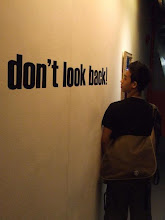Any Prison Break fans out there?

Do you recognise him?

And what's your impression of the person featured in the photo below? Is it the same for the previous two photos you have seen?

I do not have a tattoo by the way....
The word "tattoo" comes from the Tahitian "tatau" which simply means to mark.
Tattoos serve different purposes and carry a variety of meanings for various people. For some people, it may represent a symbol of faith, identity, and memory for lost love ones . For others, it could just well be a fashion statement.
Tattoos have the power to leave a strong impression on people, how they perceive you as a person, and maybe even create a strong social stigma.
In the past, tattoo-ing was often associated with triads, gangsters and secret societies. Each gang had its own distinct tattoo, and members who owed allegiance to the group had to have the mark of a tattoo on themselves. Tattooing therefore came to be associated with anti-social activities and people with tattoos were looked down upon.
Recently, I have noticed an increasing number of youths with tattoos walking along the streets. Interestingly enough, an online study indicates that getting tattoos is an increasing popular trend amongst the youths worldwide. Hence I thought maybe this would be an interesting topic to work on for the research project, in a local context. As we move into the 21st century, it would be interesting to find out how the general public percieves youths of generation Y having tattoos. Does having a tattoo carry any social implications on them these days? Are these youths with tattoos still considered deviant or are we open minded enough in today's society to accept their behaviour? Having the answers to these questions, tattoo-ing studios may then be able to develop better strategies to change people's mindset about the art, making people more receptive to tattoo-ing, which will in turn improve their business.
In a nutshell, here's what i propose.
Issue presented:Increasing trends of youths (GEN Y) getting tattoos in Singapore.
Possible research question:Do youths (GEN Y) with tattoos carry a social stigma these days? Generation Y population refers to the people born in from 1982 to the mid-1990s.
Survey required?Yes. Survey is required to get a general opinion on whether there is a social stigma that tags along with a Generation Y individual. If it is proven to carry a social stigma, what are its implications? If proven otherwise, why is it so? People being surveyed will include people from both Generation X and Generation Y to cut down biasness.
Hypothesis:Having tattoos no longer carry a social stigma for our Generation Y population.
Purpose Statement:The objective of the report is to determine whether having tattoos carry any social stigma in our Generation Y population these days. Results will then allow tattoo-ing services companies in Singapore to come up with business strategies that overcome possible stereotypes people have and better promote the art of tattoo-ing. The report is also prepared for the general public. The purpose is to let them have a better insight on the current perspective that people have on tattoo-ing among youths these days.









